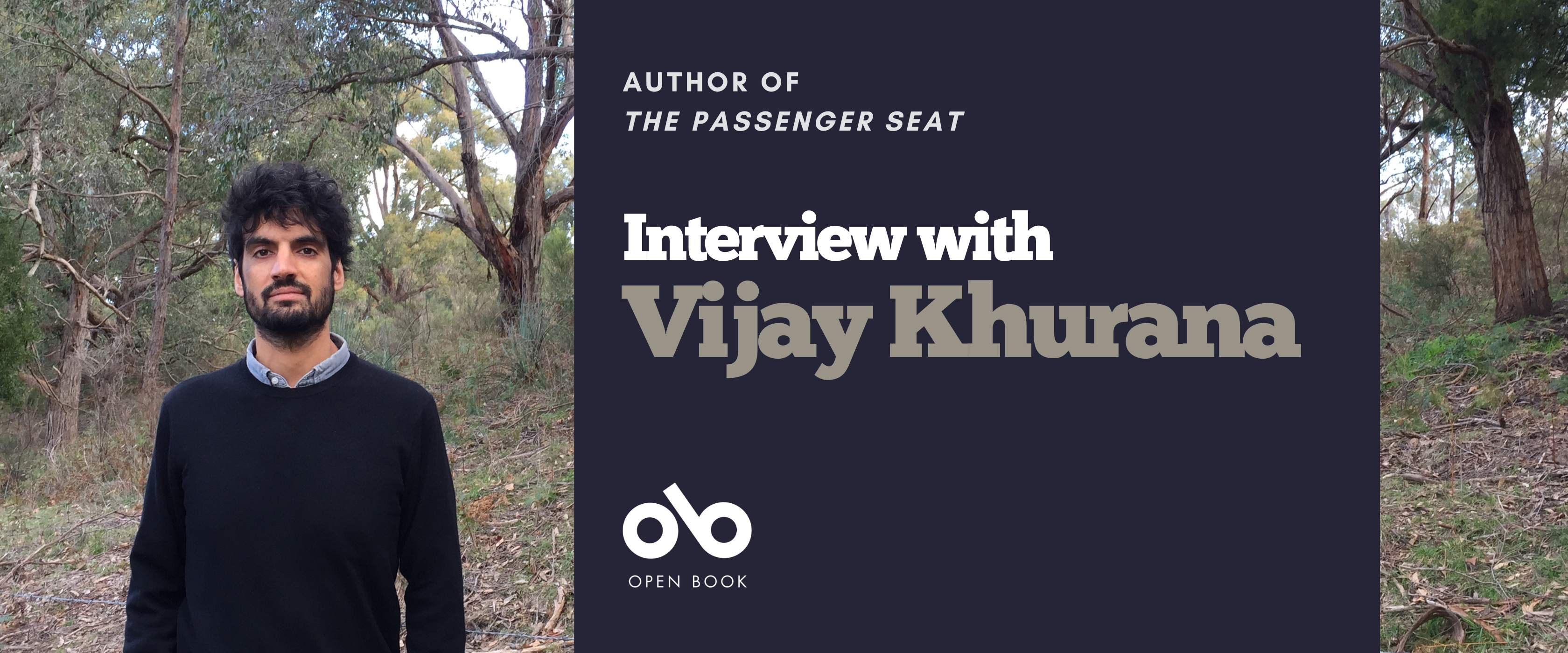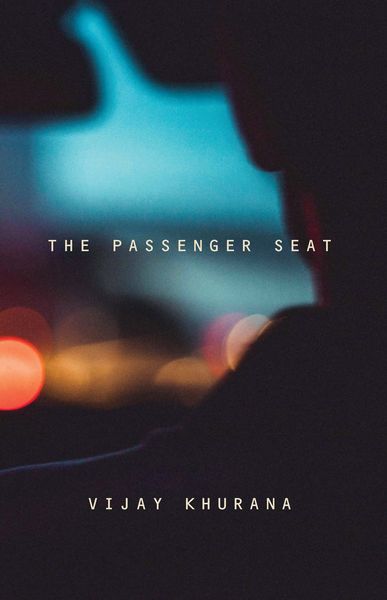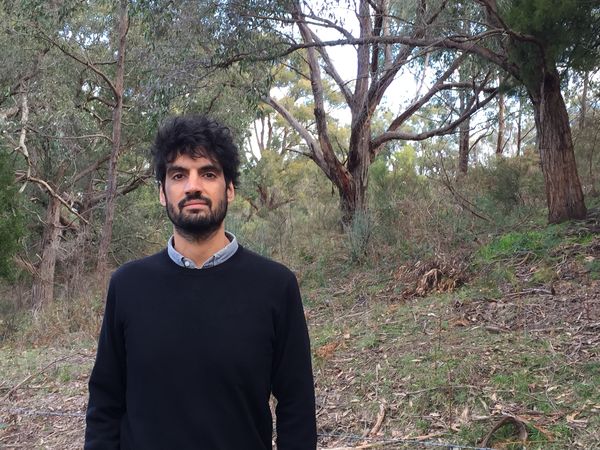Acclaimed Author Vijay Khurana Explores the Complexity of Male Friendships in His Debut Novel
With accolades already piling up for his previous writing and translation work, readers will be eager to dig into the debut novel from Vijay Khurana. The author has studied complex relationships dynamics in an academic context, along with the effects of separation and loneliness on various people, and he brings all of that expertise and careful consideration to bear in his latest work.
In The Passenger Seat (Biblioasis), two teenagers take a random road trip through the wild. They are poorly provisioned and reliant only on hastily gathered supplies and gear, and, ominously, a rifle that they've bought. As they lean into this adventure, and find themselves increasingly isolated and out of reach from their friends and families, they begin to test the limits of their behaviour, eventually leading to an encounter with a young couple they run into on the highway that pushes them past the point of no return.
It's a fascinating debut from an emerging fiction writer with a unique voice, and we're thrilled to share this Long Story Novelist Interview with Khurana right here on Open Book!
Open Book:
Do you remember how you first started this novel or the very first bit of writing you did for it?
Vijay Khurana:
An image came to me of a teenager jumping from a bridge into a shallow river. He jumps for the thrill of it, for the danger of it, for the senseless fun of it. It’s a small transgression (other people say it’s too dangerous given the height of the bridge and the shallowness of the water) but it’s also a mundane kind of routine. He jumps, then he climbs back up to the bridge, then he jumps again.
After he’d jumped a couple of times, I realized that this teenage boy I was imagining would never jump from the bridge unless there were a second teenage boy there to witness him doing it. There would be no point unless he was being observed. So now I had two boys, both jumping and each observing the other, and at that point the jumping became something else: a game. That meant it must have implicit rules, plus a potential winner and loser. And the only conceivable name for that necessary second boy, without whom there would be no jumping, who was witness and co-conspirator and partner and opponent rolled into one, was: a friend. That’s where I started. I knew about the friendship before I knew who the friends were.
OB:
How did you choose the setting of your novel? What connection, if any, did you have to the setting when you began writing?
Your CanLit News
Subscribe to Open Book’s newsletter to get local book events, literary content, writing tips, and more in your inbox
VK:
It’s set in an unnamed part of North America—there are a few reference points given but the landscapes and places are all invented. I was partly led by some real events that I draw on in the first section, but in fact even before writing The Passenger Seat this imagined northwestern North America existed in my mind, and I had set an unpublished short story there. I have lived in a lot of different places as a child and an adult, and I think that has affected my approach to writing about place. There’s no predominant setting in my fiction, and I usually like creating places from imagination rather than memory.
OB:
Did the ending of your novel change at all through your drafts? If so, how?
VK:
In the earliest drafts, the story ended at the hot springs, where the teenagers Teddy and Adam end up as their tragic road trip comes to a halt. But I soon realized I needed to keep going without them, that I needed to depict a second male friendship as a point of contrast with the first. That’s how I came up with Ron and Freeman, two men in their fifties whose lives have been tangentially affected by the violence committed by Teddy and Adam a couple of years earlier. Ron has convinced himself that he is more of a victim of Teddy’s actions than he really is. It’s a way of comparing men we tend to think of as monstrous with those we tend to think of as “essentially good”, and exploring the connections between the two.
OB:
Did you find yourself having a "favourite" amongst your characters? If so, who was it and why?
VK:
The hardest thing about writing this novel was spending such intense and sustained time with these male characters and their actions. There are no favourites among them, and nobody comes out of it looking good.
There is a woman at a rural gas station, who only appears for a few pages; I think about her sometimes. I think she understands the world better than I do.
OB:
If you had to describe your book in one sentence, what would you say?
VK:
The Passenger Seat is about the connections between male friendship and violence.
OB:
Did you do any specific research for this novel? Tell us a bit about that process.
VK:
I was very interested in homosocial relationships and male friendship specifically. I had been reading Eve Kosofsky Sedgwick’s Between Men and thinking about the ways in which friendship was a mutual performance, especially among young, heterosexual men. I also remember being struck by the way the “Underground Man” in Dostoyevsky’s Notes from Underground keeps calling his readers “Gentlemen”. Dostoyevsky’s narrator is addressing “the boys”, even if they’re just his own internal boys. Masculinity demands an audience. It doesn’t exist unless it’s being performed for somebody else. That’s why I think the friendship is so important to understanding it.
I was also struck by how there was so much amazing fiction about female friendships but comparatively little about male friendships. I remember being blown away by Fleur Jaeggy’s Sweet Days of Discipline and thinking, what would the male version of this be? I don’t think The Passenger Seat is that, but it was a useful question to ask when I was starting out.
For a while I worked as a journalist, and I got quite preoccupied with how stories of violence and tragedy get commodified and streamlined for the sake of the media themselves. The two dominant narratives about a perpetrator of violence seem to be either that he is a monster from whom society can’t learn anything and so needn’t bother trying, or the sort of “trauma narrative” about how violence begets violence. I think a lot of fiction is willing to accept this binary too. I wanted to explore this difficult theme without giving the reader any comforting moral judgements or neat resolution.
OB:
Who did you dedicate your novel to, and why?
VK:
I had a friend with whom I went on several road trips back in my teens and early twenties. I found myself thinking about those trips a lot while writing, especially about the road trip’s great contradictions, like the infinite freedom of the open road vs. the cramped, stifling, domestic space inside the vehicle. My friend passed away a few years ago, just before I started working on the book. We had fallen out of touch, but I was glad to have him with me as I wrote.
_____________________________________
Vijay Khurana is a writer and translator based between Berlin and London. His work has appeared in NOON, The Guardian, 3:AM Magazine, The Erotic Review, and elsewhere. He is currently completing a PhD in Creative and Critical Writing at Queen Mary, University of London, researching the disembodied voice and its effect on diaspora, long-distance relationships and loneliness. An excerpt from his translation of the German novel Red (Hunger) by Senthuran Varatharajah appears in the 2024 White Review translation anthology. The Passenger Seat, his first novel, was shortlisted for the 2022 Novel Prize.






